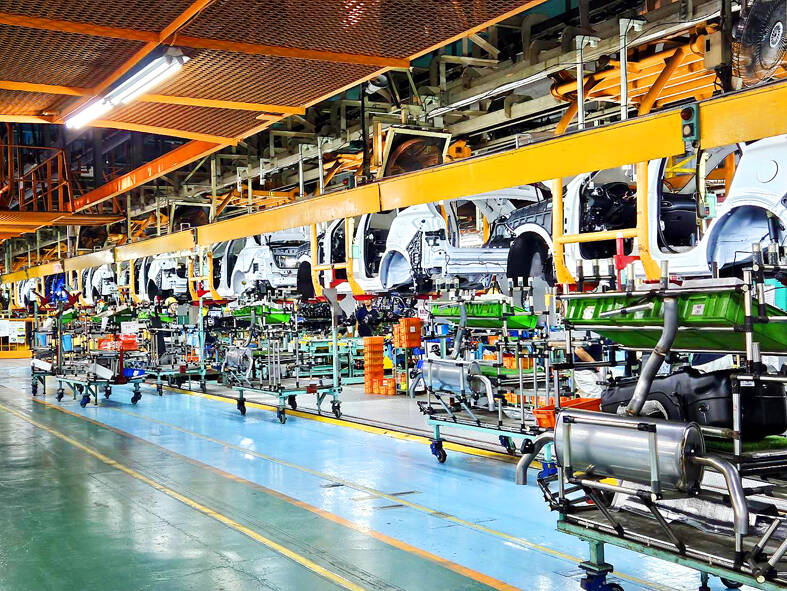US car imports are part of the tariff talks with Washington, Vice Premier Cheng Li-chiun (鄭麗君) said yesterday, but she offered few details on the discussions.
Levies on US car imports, and their compliance with safety and emissions standards were still being negotiated, she added.
Cheng made the statement in response to a question on whether Washington had demanded zero tariffs on US-made vehicles imported into Taiwan.

Photo courtesy of the Taiwan Transportation Vehicle Manufacturers Association
Democratic Progressive Party Legislator Wang Ting-yu (王定宇) said there were already rumors about zero tariffs and that the US had made similar demands from Japan and South Korea.
Cheng said that Washington expressed hope for greater openness and expanded market access for US-made vehicles, but she did not provide further details.
Technical aspects were also being discussed, the vice premier said, adding that the outcome would be presented to the legislature and the public once finalized.
Cheng said she has held three videoconferences with US officials since Aug. 1.
The talks remained focused on securing a better tariff rate, ensuring a fair process under US trade law and preventing stacked tariffs, or multiple tariffs being applied to the same product, she said.
They also covered Section 232 of the US’ Trade Expansion Act, as Taiwan has the sixth-largest trade surplus with the US, with about 90 percent of that coming from semiconductors, and information and communication technology products, she added.
The Taiwanese negotiating team would try to seek the best tariff for semiconductors, Cheng said, adding that she expected Washington to arrange a concluding meeting once a certain level of agreement was reached.
In April, the US launched an investigation under Section 232 of the act for a possible tariff on semiconductor imports.
Earlier this month, US President Donald Trump threatened a tariff of about 100 percent on imported semiconductors, but said there would be no charge if companies were building them in the US.

POSITIVE DEVELOPMENT: Japan and the US are expected to hold in-depth discussions on Taiwan-related issues during the meeting next month, Japanese sources said The holding of a Japan-US leaders’ meeting ahead of US President Donald Trump’s visit to China is positive news for Taiwan, former Japan-Taiwan Exchange Association representative Hiroyasu Izumi said yesterday. After the Liberal Democratic Party’s landslide victory in Japan’s House of Representatives election, Japanese Prime Minister Sanae Takaichi is scheduled to visit the US next month, where she is to meet with Trump ahead of the US president’s planned visit to China from March 31 to April 2 for a meeting with Chinese President Xi Jinping (習近平). Japan and the US are expected to hold in-depth discussions on Taiwan-related issues during the

‘LIKE-MINDED PARTNER’: Tako van Popta said it would be inappropriate to delay signing the deal with Taiwan because of China, adding he would promote the issue Canadian senators have stressed Taiwan’s importance for international trade and expressed enthusiasm for ensuring the Taiwan-Canada trade cooperation framework agreement is implemented this year. Representative to Canada Harry Tseng (曾厚仁) in an interview with the Central News Agency (CNA) said he was increasingly uneasy about Ottawa’s delays in signing the agreement, especially as Ottawa has warmed toward Beijing. There are “no negotiations left. Not only [is it] initialed, we have three versions of the text ready: English, French and Mandarin,” Tseng said. “That tells you how close we are to the final signature.” Tseng said that he hoped Canadian Prime Minister Mark Carney

President William Lai (賴清德) yesterday bestowed one of Taiwan’s highest honors on Saint Vincent and the Grenadines (SVG) Ambassador Andrea Clare Bowman in recognition of her contributions to bilateral ties. “By conferring the Order of Brilliant Star with Grand Cordon on Ambassador Bowman today, I want to sincerely thank her, on behalf of the Taiwanese people, for her outstanding contribution to deepening diplomatic ties between Taiwan and SVG,” Lai said at a ceremony held at the Presidential Office in Taipei. He noted that Bowman became SVG’s first ambassador to Taiwan in 2019 and

A man walks past elementary school artworks at the Taipei Lantern Festival in Ximen District yesterday, the first day of the event. The festival is to run from 5pm to 10pm through March 15.